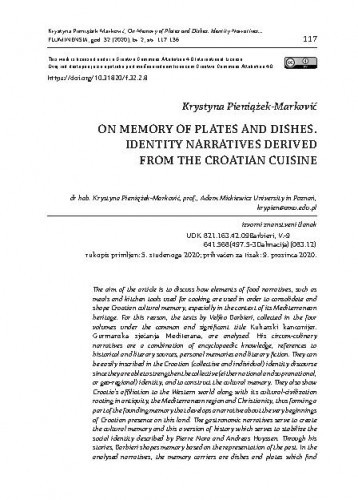The aim of the article is to discuss how elements of food narratives meals and kitchen tools used for cooking are used in order to consolidate and shape the Croatian cultural memory, especially in the context of its Mediterranean heritage.For this reason, the texts by Veljko Barbieri, collected in the four volumes under the common and significant title Kuharski kanconijer. Gurmanska sjećanja Mediterana, are analysed. His circum-culinary narratives are a combination of encyclopaedic knowledge, references to historical and literary sources, personal memories and literary fiction. They can be easily inscribed in the Croatian (collective and individual) identity discourse since they are able to strengthen the collective (either national and supranational, or geo-regional) identity, and to construct the cultural memory. They also show Croatia's affiliation to the Western world along with its cultural-civilization rooting in antiquity, the Mediterranean region and Christianity, thus forming a part of the founding memory that develops a narrative about the very beginnings of Croatian presence on this land. The gastronomic narratives serve to create the cultural memory and this version of history which is to stabilize the social identity described by Pierre Nora and Andreas Huyssen. Through his stories, Barbieri shapes memory based on the representation of the past. In the analysed narratives, the memory carriers are dishes and plates which find reference to the oldest history of Croatia rendered by myths and other narratives. Associated with dishes, the pots enable the narrator to recall the past and the identity coded in individual dishes. They also participate in the processes of repeating, storage and remembering which generate a symbiotic relationship between man and thing. The memory carriers that is, food and plates depicted in Barbieri's culinary narratives do not convey their content in a neutral way, but construct their marked images.; U ovome je radu riječ o upotrebi prehrambenog koda (jela i predmeta koji su neophodni za njihovu pripremu) s ciljem oblikovanja i utvrđivanja hrvatskog kulturnog pamćenja, prije svega pamćenja o pripadanju mediteranskome krugu. Predmet analize su tekstovi Veljka Barbierija sabrani u četiri sveska pod zajedničkim, znakovitim naslovom Kuharski kanconijer. Gurmanska sjećanja Mediterana. Kulinarski eseji – u kojima je osim enciklopedijskog znanja, pozivanja na povijesne i književne izvore ili osobne uspomene prisutna i književna fikcija – upisuju se u hrvatski identitetski diskurs (kolektivni i individualni), osnažuju kolektivni identitet (nacionalni i nadnacionalni, georegionalni) i oblikuju kulturno pamćenje. Nositelji su pamćenja u istraživanim naracijama jela i posuđe, a njihovo pamćenje obuhvaća najstariju povijest prostora na kojem se odigravaju ispričane priče (uključujući mitove) i gdje se jedu s njima povezana jela. Nositelji pamćenja, koji su hrana i posuđe, kao i mediji pamćenja, koji su Barbierijeve kulinarske naracije (eseji), slično drugim nositeljima (medijima) pamćenja nisu neutralan prijenosnik sadržaja nego čimbenik koji konstruira predodžbe o njima.
Sažetak

 Fluminensia : časopis za filološka istraživanja : 32,2(2020) / glavni i odgovorni urednik Aleksandar Mijatović.
Fluminensia : časopis za filološka istraživanja : 32,2(2020) / glavni i odgovorni urednik Aleksandar Mijatović.